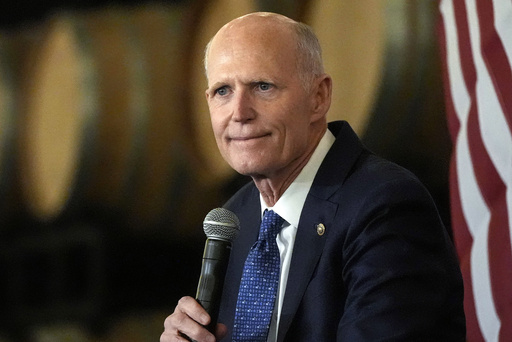Senate Republicans are actively campaigning across the nation in anticipation of an important ballot set for the week following the presidential election. This is part of the effort to choose a successor to Mitch McConnell, who has led the Senate GOP for nearly twenty years and is set to step down from his leadership role in January. Though many GOP senators are maintaining a low profile regarding their endorsements, two prominent figures, South Dakota’s John Thune and Texas’s John Cornyn, are emerging as the leading candidates for the November 13 secret ballot. The direction this decision takes could significantly influence the party’s trajectory, particularly if Republicans secure enough seats in the upcoming election to reclaim the Senate majority.
As of now, the endorsement landscape remains largely uncertain. A handful of Republican senators have publicly declared their support for a candidate, while many others remain indecisive. Florida Senator Rick Scott, who is juggling his own reelection campaign, could potentially disrupt the dynamics of the race. The possibility of another candidate entering the fray has also not been ruled out, keeping the competition fluid.
The similarities between the two leading candidates, Thune and Cornyn, create a challenging choice for their colleagues. Both senators have a strong reputation within the party and are seen as members of its more traditional wing, following in McConnell’s footsteps. Yet, both are also signaling a desire to promote a more open approach that moves beyond the McConnell era.
Senator Thom Tillis of North Carolina remarked on the commonalities between the two, noting the difficulty in finding distinctions between them. One significant aspect of their campaigns is their backing of Donald Trump in the upcoming presidential election. Despite their history of conflict with Trump, particularly following the January 6 Capitol insurrection, both senators have engaged with him frequently over recent months, attending campaign rallies and even visiting his Florida residence.
The potential for Trump to play a role in influencing the outcome of the leadership race is an intriguing development. Cornyn remarked on the complexities involved, suggesting that the rivalry is fundamentally a contest between the two senators themselves. Meanwhile, some of Trump’s close allies in the Senate are advising him to take a step back from the selection process. Oklahoma Senator Markwayne Mullin, supporting Thune, has indicated that he has been encouraging Trump not to get involved in endorsements at this juncture, emphasizing the importance of fostering a positive relationship with the next Senate leader.
Tillis cautioned that a Trump endorsement could have adverse effects and complicate the dynamic within the Senate, which he described as a tight-knit group of colleagues. Nonetheless, both candidates maintain a close connection with Trump; Cornyn interacted with him during a Texas visit and participated in a rally in Nevada. Thune, who previously condemned Trump’s actions surrounding the January 6 events, highlighted a pragmatic perspective on their relationship, emphasizing the business-like nature of their interactions moving forward.
On the other hand, Scott, who has long been a Trump confidant, may leverage his connection to the former president to gain traction in the leadership contest. He has been active in supporting Trump during various legal challenges, which could position him favorably should Trump decide to endorse him. Both Thune and Cornyn have also been significantly involved in fundraising efforts across the country, making numerous campaign stops for fellow GOP senators.
Thune has chalked up an impressive record of fundraising, raising over $31 million this cycle to assist Senate races and directing substantial funds to the Senate Republican campaign committee. Similarly, Cornyn has a long history of financial support for Republican candidates, having contributed over $400 million during his time in the Senate. When it comes to legislative policies, both candidates generally align with party values but have shown a willingness to collaborate with Democrats on certain issues.
The support from conservative factions within the Republican Party that have challenged McConnell in recent years remains to be seen, particularly those who advocated for less leadership control over individual senators. Cornyn has proposed a vote regarding term limits for the Republican leader in a strategic overture to win the backing of these dissenters. In a push to engage his colleagues, Cornyn expressed the belief that the Senate needs more individual senator participation in leadership decisions.
Meanwhile, figures such as Senator Josh Hawley, representing a more conservative sector of the party, are awaiting clearer commitments from the candidates regarding their legislative agendas and partnership with Trump moving forward. The coalition of senators seeking to shift power dynamics within the party continues to advocate for more influence for individual lawmakers, but the current frontrunners have showed considerably less interest in restructuring leadership styles than some factions may desire.
In conclusion, both Thune and Cornyn appear attentive to the desires for change among their colleagues, yet are cautious about compromising the leader’s position significantly. Thune expressed a willingness to incorporate some reforms while holding firm on maintaining the strength of the leadership role, underlining the importance of a balance between empowering individual members and preserving the cohesion and authority of the party’s leadership structure.
